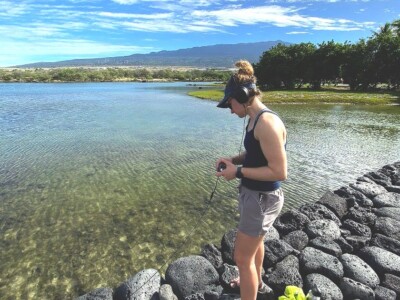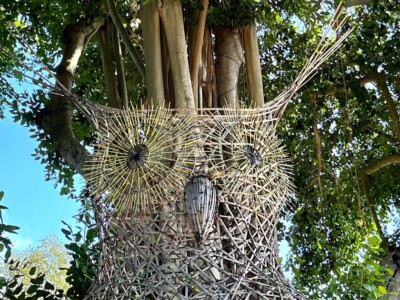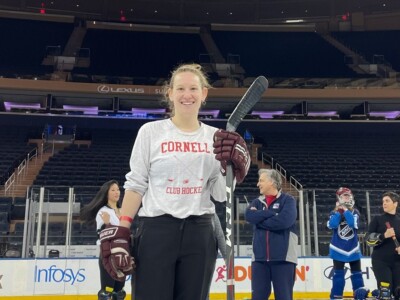Voting is available February 1-28 for Cornell alumni to elect two new members to the Cornell University Board of Trustees. The Committee on Alumni Trustee Nominations has endorsed the following four candidates: Valisha Graves ’85, John W. Rawlins III ’06, John R. Toohey-Morales ’84, and Bobby S. Tsai ’83.
Learn more about the candidates and how they think trustees and alumni can help ensure that Cornell remains accessible to the most talented prospective students around the world regardless of their financial circumstances.
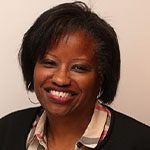 Valisha Graves ’85
Valisha Graves ’85
What inspired you to choose Cornell?
I chose Cornell because it offered first-rate academics, a beautiful campus, and generous financial aid. Also, the size of the student body was ideal because it gave me an opportunity to meet and interact with students from diverse backgrounds; the academics would prepare me for the world of work and service; and work-study and financial aid made Cornell affordable for my parents and me. I enrolled in the College of Arts and Sciences seeking a liberal arts education and taking pre-law courses with the goal of eventually becoming a prosecutor. Honestly, I wasn’t aware of the other colleges when I applied, so it was a bonus to be able to take courses in the Ag School (now CALS), Hotel School (now Cornell Nolan School), and Law School.
What does “to do the greatest good” mean to you personally, and in terms of your service to Cornell?
“To do the greatest good” means to identify one’s innate gifts and talents, share them, be in service to others, and pay it forward. Everyone, regardless of their station in life, has a gift(s) to share with family, community, houses of worship, in the workplace, and even to complete strangers. To do the greatest good implies intentionality—the act of sharing with the explicit goal of making an impact.
In terms of my service to Cornell, it begins with an acknowledgment that my Cornell education has truly been a blessing. My Cornell volunteer journey started in small ways with my time—speaking on career panels, mentoring students, and ultimately leading alumni volunteer organizations like PCCW. It has also been philanthropic—giving to areas of interest and greatest need.
Why is it important to ensure Cornell is accessible to all, at an affordable cost? How can trustees and alumni help address this priority?
It is a strategic necessity that institutions of higher education be accessible and affordable, and I would add relevant for sustained success. Relevant in terms of being a preferred choice for education seekers and learners. Only 44% of high school students enroll in a four-year college. The challenge for Cornell is how best to make the on-campus college experience desirable and affordable for a larger pool of talented students.
As stewards of the university, Cornell trustees provide financial oversight to ensure the institution is managed in a fiscally prudent manner. This work is a monumental undertaking given the high fixed costs associated with delivering quality higher education in the United States.
In addition, trustees provide strategic direction and leadership in the areas of development and alumni engagement to ultimately secure the necessary resources to increase the endowment and fund scholarships to ensure goals for accessibility and affordability are met.
What excites you about the future of the university?
I am excited that the university, led by the Board of Trustees, continues to progress Ezra Cornell’s founding principle of “… any person … any study” in bold and innovative ways, such as Cornell Tech, the Ann S. Bowers College of Computing and Information Science, and the new Cornell Jeb E. Brooks School of Public Policy, along with many other strategic investments and initiatives. Cornell is well-positioned among its Ivy League peers to attract and meet the needs of 21st-century learners.
If you could start over as a Cornell student today, what class or extracurricular would you most want to explore?
I would have loved to take Psych 101 with Professor James Maas (since retired). As the study of human behavior, psychology drives our life decisions and influences our personal interactions; understanding how the mind works and what makes people tick is like unlocking a secret code. Some background on this subject would have been invaluable in my personal and professional relationships. I know that I would have really enjoyed this course given Professor Maas’ reputation, and it would likely have led to my exploration of other related courses.
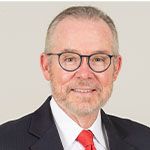 John R. Toohey-Morales ’84
John R. Toohey-Morales ’84
What inspired you to choose Cornell?
I came from a small school in San Juan where no one had ever heard of a student wanting to pursue a career in meteorology. So, with little help from the school counselor, I took it upon myself to research schools that offered the major. I picked Cornell out of that big phone book-like publication, the Barron’s college guides, and applied sight unseen. How I got in? I still don’t know—but I gained a first-hand appreciation for the value of need-blind admissions, especially for those in frontline communities. Almost immediately, I was embraced by the warmth and enthusiasm of the alumni community at the Cornell Club of Puerto Rico. I quickly realized how much love Cornellians have for their alma mater. It’s contagious, and now I bleed Big Red!
What does “to do the greatest good” mean to you personally, and in terms of your service to Cornell?
Doing the greatest collective good starts with each one of us as individual Cornellians. I might have been a little starstruck when I got to campus sight unseen straight from Puerto Rico. But I took full advantage of many of the opportunities that Cornell offers students—not just as a student-athlete on the Cornell Rowing team but also as an engaged community member on and off campus. The academics and hands-on weather forecasting made me a good Cornell-trained scientist. Writing seminars, CALS Department of Communication classes, and WVBR made me an excellent communicator. I try to leverage that to be a good ambassador for the university. Becoming a Cornellian led to a series of personal choices and a career track that collectively had a ripple effect across my community and beyond. It’s a Cornell story repeated thousands of times, each bearing fruit in the form of a positive societal impact—the greatest good.
Why is it important to ensure Cornell is accessible to all, at an affordable cost? How can trustees and alumni help address this priority?
We all know the impact that a Cornell education has had on our own lives. Ensuring that our new graduates come from varied backgrounds by protecting and widening our alma mater’s efforts to broaden diversity, equity, and inclusion (DEI)—even in the face of headwinds—will allow us to spread the “greatest good” far and wide. With the university admissions landscape likely to soon change, if “… any person … any study” is to be energetically protected and fostered, trustees will need to encourage innovative methods in identifying the best students at every level, including those coming from lower and middle-income households. This is an achievable goal if approached creatively and vigorously, especially in the era of big data. And because representation is so very important, I’m a card-carrying, flag-waving, and committed member of the Cornell and CALS Puerto Rican alumni family.
What excites you about the future of the university?
Cornellians collaborate across boundaries in ways others can’t. Today’s Cornell students, faculty, and alumni can rise to take on some of our biggest problems, like inequality, climate change, and public health, in a very unique way thanks to Cornell’s biggest virtue—“… any person … any study.” Our university boasts a broad spectrum of majors and advanced degree offerings, many of which are now increasingly interdisciplinary by design and leveraging academic and hands-on experiences outside the silos of individual colleges and concentrations. This puts Cornell, possibly more than any other institution, in a prime position to develop groundbreaking transdisciplinary solutions to the monumental challenges facing humankind this century. There is perhaps no greater overarching goal than to, in the words of the United Nations, promote prosperity while protecting the planet. I know Cornell and Cornellians can lead the way.
If you could start over as a Cornell student today, what class or extracurricular would you most want to explore?
I fondly recall unusual learning experiences from when I was on campus in the early 1980s. From an experimental college bartending class at The Thirsty Bear bar on North Campus to the Insects and Man course taught by famed roach-walking and ant-eating Cornell entomology professor Ed Raffensperger, there was no shortage of out-of-the-box happenings back then. One set of skill-building classes that I did not get to participate in was part of the Cornell Outdoor Education offerings—known as Wilderness Reflections back then. From backpacking to biking, caving to climbing, I wish I had had an opportunity to join at least one course with this now 50-year-old program. It might have helped me put our infamous Cornell swim test to good use!
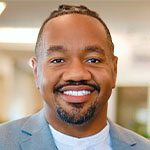 John W. Rawlins III ’06
John W. Rawlins III ’06
What inspired you to choose Cornell?
I remember receiving the Big Red Book in the mail and reading about Cornell, specifically about the ILR School, as I desired to be a lawyer. I initially intended to apply there as an option. A few weeks later, my high school guidance counselor pulled me out of class to speak with a close friend of hers who was visiting the area, and at the time, she worked for the College of Human Ecology. We talked about some of my career goals, and she spoke to me about how Human Ecology could help me achieve those goals. So, with her advice, I applied there instead.
Simultaneously, I applied for a scholarship from the DC-based Freedom Forum/Project Excellence scholarship program. I would later be awarded a full tuition partnership scholarship, specifically to Cornell. Funny enough, that phone call came days before my acceptance letter to Cornell! That scholarship opportunity greatly helped me and my family decide I would attend Cornell.
What does “to do the greatest good” mean to you personally, and in terms of your service to Cornell?
Doing the greatest good means doing all you can to assist others in achieving their goals, living their dreams, and helping as many people as possible to impact the communities they belong to positively. I see that being done by myself and colleagues in higher education every day on campuses across the country and worldwide. We aim to help students grow and develop into productive and impactful global citizens that strive to help better the human condition.
In my service to Cornell, I see this as utilizing my talents and areas of expertise to help the university in the most meaningful ways. This is where I have leveraged my work in diversity, equity, and inclusion in higher education to bring about awareness of how we can best serve our underrepresented populations. Especially in times of turmoil and unrest globally and domestically, I have worked to help bring awareness and support to these issues and their impact on the various communities within our Cornell family. I am a firm believer in “lifting as we climb,” and that can be achieved by doing the greatest good.
Why is it important to ensure Cornell is accessible to all, at an affordable cost? How can trustees and alumni help address this priority?
I often reflect on how much Cornell fundamentally changed my life. If it were not for a scholarship, I would not have been able to afford Cornell and, therefore, would not have had the transformative experience I did, nor would I have been able to share the fruits of that experience with so many in and outside of the university. Our accessibility is important, and we must consider that all future changemakers, innovators, and world leaders may not have the resources to afford Cornell outright.
We have done well prioritizing affordability as an issue to be addressed, but there is more for us to do. Through strategic planning, the board’s continued work and advocacy around affordability and basic needs, gifts from our alumni, connections to local, national, and international organizations that share our institutional values, and the establishment of new endowments and other scholarships, we can make our institution accessible to exceptional students from around the world who will bring their diverse perspectives and talents to our community.
What excites you about the future of the university?
I am excited to see how Cornell will continue to challenge the status quo and elevate how students not only learn but also enhance various fields of study while turning things on their heads. Provost Kotlikoff’s radical collaborations initiative highlights this well. I recently read about the new multi-college and transdisciplinary Department of Design Tech. This kind of radical collaboration can only happen when you have faculty and administrators who are fearless and willing to go beyond conventional methods to be innovative.
I am also excited to see how Cornell continues to positively impact the local Ithaca community. Part of my journey led me to live in Ithaca for eight years beyond my time at Cornell, and that time allowed me to experience Ithaca in such a different way from when I was a student. While we are already a top employer in the area and facilitate many opportunities for the community, I am excited to see how we will continue to foster and support the best of what Ithaca has to offer and add even more to it. This will also make us an even stronger model for other universities in fostering town/gown relationships.
If you could start over as a Cornell student today, what class or extracurricular would you most want to explore?
One of the dreams that I’ve had for the last few years is to get into the food and beverage space. With that in mind, I would definitely be looking to the Nolan Hotel School and its course options in food and beverage. Three of the courses I would likely want to take would be:
- HADM 1102 – Entrepreneurship and Concept Development in the Food and Beverage Industry;
- HADM 4380 – Culture and Cuisine; and
- HADM 5510 – Restaurant Development.
I believe that these courses would elevate my passion for creating food and beverage concepts responsibly and would also equip me with what I would need to begin a successful career in this industry.
 Bobby S. Tsai ’83
Bobby S. Tsai ’83
What inspired you to choose Cornell?
I wished I had a more profound answer to this, but honestly, it was the climate. Having been born in Taiwan and spent four years in Southern California for high school, I had never seen snow. So, contrary to many who might not have looked upon Ithaca’s winter favorably, I actually looked forward to it. The first time I saw snowflakes falling from the sky was in late November. While walking up Libe Slope, I noticed something drifting from above and slowly descending to the ground, and I had no idea what it was. It took me a good 30 seconds to realize that I was looking at snowfall. I was so thrilled. Of course, by my sophomore year, I was no longer fascinated by snow and wished we could have fall weather all year long.
What does “to do the greatest good” mean to you personally, and in terms of your service to Cornell?
In a world with resources being limited and unequally distributed, “to do good” necessitates self-sacrifice. If I only look after my own interests, I have little capacity remaining to seek the good for others. Since self-sacrifice is not a normal human instinct, I had to work hard to cultivate this. All the distinguished volunteer leaders have this attribute in common. They believe in giving back, paying it forward, and striving to do more for the community than to satisfy their own desires. These examples are what have inspired me. And speaking about inspiration, I must mention Mr. Martin Tang, who mentored me since my early days as a Cornell volunteer. So, my personal mission in “doing the greatest good” will be to nurture future volunteer leaders to ensure our beloved Cornell will always be supported by the best people with the biggest hearts.
Why is it important to ensure Cornell is accessible to all, at an affordable cost? How can trustees and alumni help address this priority?
I am concerned about this issue of affordability. I use the term “value proposition” to describe this challenge. The cost of attending universities in the United States is generally higher than almost anywhere else in the world: reaching about $80,000 per year and still climbing. I sense there is now resistance to the justification of college costs. At the same time, some peer institutions are starting to provide more generous financial support in order to appeal to talented students from all backgrounds. More than ever, this will become a competitive disadvantage to any schools that lack such a program. While I still affirm the merits of capital expenditure for better infrastructure, we need to find ways to boost our endowment for scholarship and financial aid. That will be an essential part of safeguarding Cornell’s greatness.
What excites you about the future of the university?
Diversity is Cornell’s greatest strength. Unique to us is that we are not elitist in our outlook yet world-class in our product/service. In a world where people are becoming more divisive, where mere differences now lead to immediate disputes, Cornell can offer a model to show the world that we embrace and celebrate differences. We are at our best when we are inclusive instead of exclusive. Of course, Cornell will continue to act as a leading light for advancement in science and technology, which positively impact our lives. But, it will be our ability to demonstrate our moral underpinning of understanding and acceptance that will set us apart.
If you could start over as a Cornell student today, what class or extracurricular would you most want to explore?
That is every person’s fantasy: an opportunity to have a “do-over.” Knowing what I know now, I would not be so mercenary as a student. Back then, my purpose in studying was to achieve the highest grades and to find the best possible job after graduation. But learning as a young adult should not be purely for career advancement. The joy of learning is to be given an opportunity to be broadly exposed to many things and to meditate deeply on them. I cannot think of a better place to do that than Cornell, where anyone can find any study. I did not take full advantage of that. The most valuable outcome of education is the process of turning information to knowledge and knowledge to wisdom. I wish I had been such a learner back in my college days.

